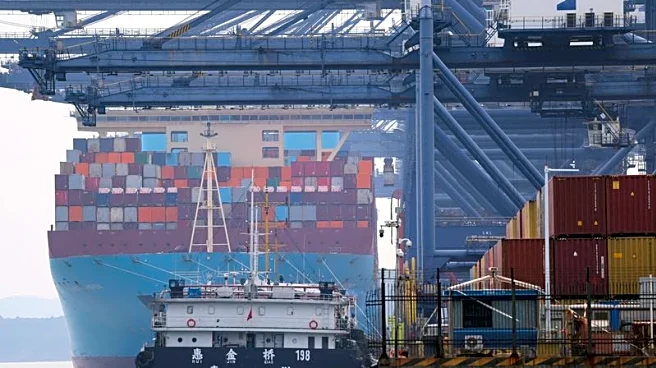What is the story about?
What's Happening?
President Trump has signed an executive order introducing a $100,000 annual fee for applicants to the H-1B visa program, which is designed to bring skilled foreign workers into the United States. The order cites 'abuse' of the program and mandates payment for entry. This move is part of a broader immigration strategy that includes a new 'gold card' visa for wealthy immigrants, requiring fees starting at $1 million. The fee will apply to new requests, and companies must pay the amount for each applicant over six years. The H-1B visa program, capped at 85,000 applications annually since 2004, has seen a decline in applications, with the next fiscal year recording a four-year low of about 359,000 applications. Major beneficiaries of the program include companies like Amazon, Tata, Microsoft, Meta, Apple, and Google.
Why It's Important?
The introduction of a substantial fee for H-1B visa applicants could significantly impact U.S. industries reliant on skilled foreign labor, particularly the technology sector. Companies may face increased costs, potentially leading to a shift in hiring practices or a reduction in foreign talent acquisition. Critics argue that H-1B visas undercut the American workforce, while supporters believe they are essential for attracting top global talent. The new fee could deter companies from sponsoring foreign workers, affecting their ability to compete globally. Additionally, the 'gold card' visa initiative may attract wealthy individuals, influencing immigration patterns and economic contributions from affluent immigrants.
What's Next?
The executive order is set to take effect on September 21, affecting new H-1B visa requests. Companies must decide whether the value of foreign workers justifies the $100,000 annual fee. This decision could lead to increased hiring of American workers or adjustments in business strategies to accommodate the new financial burden. Amazon has advised its H-1B visa-holding employees to remain in the U.S. and has cautioned those abroad to return before the deadline. The broader implications for immigration policy and industry practices will unfold as stakeholders react to the new regulations.
















